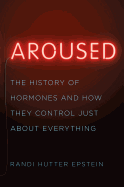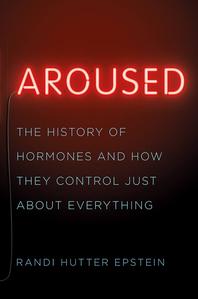
 Whenever asked to explain the rambunctious behavior of teens and pre-teens, adults often roll their eyes and say: "hormones." However, it was not until neurosurgeon Harvey Cushing explored the pituitary gland and founded the science of endocrinology in the early 1900s that medicine began to understand the role of human gland secretions and coined the word hormone (from the Greek hormao, meaning to arouse). This and other fascinating details of the history of endocrinology find their way into Randi Hutter Epstein's funny, informative and accessible Aroused (after her similarly entertaining discussion of the nuts and bolts of childbirth in Get Me Out).
Whenever asked to explain the rambunctious behavior of teens and pre-teens, adults often roll their eyes and say: "hormones." However, it was not until neurosurgeon Harvey Cushing explored the pituitary gland and founded the science of endocrinology in the early 1900s that medicine began to understand the role of human gland secretions and coined the word hormone (from the Greek hormao, meaning to arouse). This and other fascinating details of the history of endocrinology find their way into Randi Hutter Epstein's funny, informative and accessible Aroused (after her similarly entertaining discussion of the nuts and bolts of childbirth in Get Me Out).With medical and journalism degrees and as Writer-in-Residence at Yale Medical School, Epstein brings a savvy background to a book rich in clever digressions as well as scientific know-how and historical fact. She began her research thinking "hormones were boobs and periods and sex," but quickly realized that they really "control growth, metabolism, behavior, sleep, lactation, stress, mood swings, sleep-wake cycles, the immune system, mating, fighting, fleeing, puberty, parenting and sex"--most everything that makes us human.
Aroused begins with the story of the late-19th-century "Fat Bride," a 500-pound carnival freak show woman who died young of what in hindsight was clearly a hormonal imbalance. However, it quickly works into a chronological examination of the pioneers and scientific breakthroughs of endocrinology. Besides Cushing, Epstein highlights the work of Rosalyn Yalow, who won a Nobel for developing radioimmunoassay--a process for measuring hormones. Not just a meticulous researcher, Yalow also was one of the few women scientists during the male scarcity of World War II, noting: "They had to have a war so I could get a Ph.D. and a job in physics."
Epstein's history of endocrinology, however, describes more than innovative science. Aroused also traces the parallel growth of quick-cure quackery and snake-oil charlatans. The Austrian physiologist Eugen Steinach championed elective vasectomies to increase libido. A Paris neurologist advertised Brown-Séquard's testicle-juice shots and, in Kansas, John Brinkley ("The Goat Gland Doctor") sold goat testicles to enhance men's sex drive. Even today, TV has made "Low-T" into a health issue to peddle dubious testosterone supplements, and oxytocin formulas are pushed as "happy brain" elixirs. Yet Epstein additionally explores in some detail the many medical successes growing out of hormone research: therapies to moderate menopause symptoms, tools to help intersex babies and gender transition, birth control and treatments to manage obesity.
What Mary Roach did for the alimentary canal in Gulp and Hope Jahren did for botany in Lab Girl, Epstein does in spades for our glandular network: the pancreas, adrenals, thyroid, ovaries, testes and pituitary. As she summarizes: "They aim to get us back to normal when things are out of whack. And they can be the cause of commotion, too." Maybe the adults are right about flaky teen behavior after all: hormones. --Bruce Jacobs, founding partner, Watermark Books & Cafe, Wichita, Kan.
Shelf Talker: A history of endocrinology as entertaining as it is informative, Aroused adroitly covers the basic science, clinical application and dubious commercialization of hormones.

